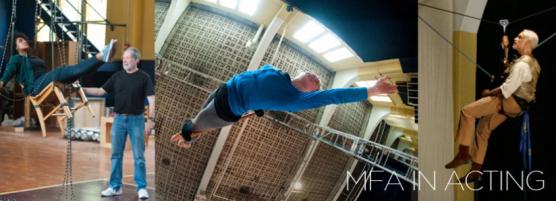Dear Prospective Student,
The MFA in Acting program at the University of South Carolina is a specialized degree with an identity strongly connected to experimentation, new work and a company-like structure. With only eight MFA actors on campus at any given moment – recruiting is every other year and the third year students participate in an off campus internship – the interaction of the students on a daily basis is very concentrated. The intensive nature of the training requires that the actors maintain a very professional attitude while existing in a highly interdependent disciplined environment. By following the structure of a producing company, the program provides the means for deep and innovative inquiry, rapid artistic growth, a high level of productivity, a well-defined personal aesthetic and development of a strong professional work ethic.
USC's Graduate Acting Program fosters challenging new performance ideas and production approaches. It recognizes the need for a variety of training, including rehearsal that culminates in performances for the public. These public productions range from Shakespeare to Shaw, from farce to realism, as well as some of the most exciting modern playwrights from all over the world. The MFA in Acting also recognizes the need for space and time to freely experiment without the need to present the work for public consumption on a deadline. New theatrical ideas need to be developed, tested, edited, re-worked, thrown out or expanded until there is sufficiently persuasive material to be seen in a public performance. The Center for Performance Experiment (CPE) was created to serve as a center for fresh, invigorating, highly original areas of artistic inquiry. It has become a center for innovation in performance technique. As well as a place where rigorous free-ranging experimentation occur on a daily basis.
The CPE is a space that provides a link between excellent teaching and performance capability. With a studio large enough to replicate the performance demands of small to mid-sized regional theaters, it is easily modified to teach performance techniques in intimate or expansive surroundings. Equally critical is that the studio is large enough to accommodate bold, expansive, imaginative thinking as students work on individual roles, or create the solo performances that make up the core of their MFA thesis. In almost every production the configuration of the CPE is changed, changing the spatial relationship of audience to performer (10 different configurations so far). This provides an invaluable learning experience for the MFA actors.
The CPE also offers a "second stage" for the MFA actors. This allows students a space to work on challenging material in addition to their work in the Theatre Carolina main season. In order to expand the scope of the actor training beyond the genres covered in acting process classes, the CPE has been utilized to stage a wide variety of material. Students are given the chance to experiment with dramatic material ranging from clown plays to Beckett. Past CPE productions include: Cosi by Michael Gow; 1942 by Robyn Hunt; An Evening of Beckett including Rockaby, selections from Malloy, and Waiting for Godot; Three Sisters; Pieces of Eight (the solo MFA thesis plays of the graduating acting class of 2013); The Hour We Knew Nothing of Each Other by Peter Handke; Te Seagull; Away, as well as five original dances. Gravity and Flight (original works of Hunt and Pearson) were both performed in New York following their productions in the CPE. Flight also recently toured to Edwardsville, Illinois, Flint, Michigan, and Bangor, Maine.
During the second year of the MFA program of study at the University of South Carolina, students perform a solo show that they have conceptualized from beginning to end. The creation of a solo performance rethinks the idea of the "thesis," that demonstrates a mastery of the artistic process with a live theatrical event as its goal. In the creation of a solo show students not only demonstrate a mastery of acting skills. The student writer/creator also shows a comprehensive understanding of dramatic action, theatrical viability, structure, use of space, and above all authenticity of idea, in the creation of the theatrical event. The solo performance also challenges the student actor to find a balance between available resources and the creation of a strong, affective theatrical event. An exercise that greatly prepares students for their professional life outside of the University.
The Center for Performance Experiment has provided a philosophical, artistic, and architectural umbrella for the MFA acting company. And the experimental work done by faculty and other professionals within the space have become an integral part of the actor’s training program at the University of South Carolina. The CPE gives students a place to learn and participate in a theatrical model that is centered on using human energy to realize creative work that stems from independent ideas. The work done in the CPE also provides students with tangible examples of artists having the will and artistic/personal courage to place their research before the public for immediate critique. This work inculcates students with a strong sense of artistic agency, in effect helping them see themselves as generating artists as well as skilled interpretive ones.
We wish you success in your search for the best personal fit in a professional graduate acting program, and hope that the above information is useful in your deliberations. If you have questions about how our program might serve your needs please feel free to contact us. We are looking for talented, motivated artists who have an insatiable curiosity about the invigorating process of acting and a hunger to deepen an understanding of their own evolving aesthetic.
Warmest Personal Regards,
Steven Pearson
Head of Graduate Acting
[email protected]
Robyn Hunt
Professor
[email protected]
















